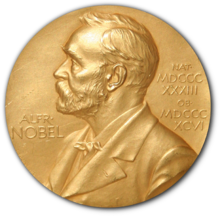1918 Nobel Prize in Literature
 "in the field of literature, produced the most outstanding work in an idealistic direction". | |
| Location | Stockholm, Sweden |
| Presented by | Swedish Academy |
| First awarded | 1901 |
| 1918 laureate | none |
| Website | Official website |
The 1918 Nobel Prize in Literature was withheld the second time since 1914 because the committee's deliberations were still disturbed by the ongoing World War I (1914–1918). The war ended on 11 November 1918, a month after the annual announcement ceremony.[1] Thus, the prize money was allocated to the Special Fund of this prize section.[2]
Nominations
[edit]Despite the ongoing war, numerous literary circles and academics still sent nomination to the Nobel Committee of the Swedish Academy. In total, the academy received 19 nominations for 17 writers.[3]
Five of the nominees were nominated first-time including Knut Hamsun (awarded in 1920), Gustav Frenssen, Alois Jirásek, Maxim Gorky, and Gunnar Gunnarsson. The highest number of nominations were for Finnish author Juhani Aho with 3 nominations. The Italian writer Grazia Deledda (awarded in 1926) was the only female writer nominated.[3]
The authors Henry Brooks Adams, Guillaume Apollinaire, Hubert Howe Bancroft, Olavo Bilac, Neltje Blanchan, Arrigo Boito, Randolph Bourne, William Wilfred Campbell, Ivan Cankar, Hermann Cohen, George Coșbuc, Max Dauthendey, William Hope Hodgson, Margit Kaffka, Harald Kidde, Paul Margueritte, Peter Nansen, Wilfred Owen, Georgi Plekhanov, Dora Sigerson Shorter, Georg Simmel, Carlos Guido Spano, Richard Voss, Frank Wedekind, Julius Wellhausen, Andrew Dickson White, Fanny zu Reventlow, and Anna Radius Zuccari died in 1918 without having been nominated for the prize.
| No. | Nominee | Country | Genre(s) | Nominator(s) |
|---|---|---|---|---|
| 1 | Juhani Aho (1861–1921) | novel, short story |
| |
| 2 | Henri Bergson (1859–1941) | philosophy | ||
| 3 | Georg Brandes (1842–1927) | literary criticism, essays | Yrjö Hirn (1870–1952) | |
| 4 | Otokar Březina (1868–1929) | ( |
poetry, essays | Arne Novák (1880–1939) |
| 5 | Grazia Deledda (1871–1936) | novel, short story, essays |
| |
| 6 | Gustav Frenssen (1863–1945) | novel, drama | Bengt Hesselman (1875–1952) | |
| 7 | Adolf Frey (1855–1920) | biography, history, essays | Wilhelm Oechsli (1851–1919) | |
| 8 | Maxim Gorky (1868–1936) | novel, short story, drama, memoir, autobiography, essays, poetry | Bengt Hesselman (1875–1952) | |
| 9 | Bertel Gripenberg (1878–1947) | poetry, drama, essays | Harald Hjärne (1848–1922) | |
| 10 | Ángel Guimerá Jorge (1845–1924) | drama, poetry | Fredrik Wulff (1845–1930) | |
| 11 | Gunnar Gunnarsson (1889–1975) | novel, short story, poetry | Adolf Noreen (1854–1925) | |
| 12 | Knut Hamsun (1859–1952) | novel, short story, drama, poetry, essays | Harry Fett (1875–1962) | |
| 13 | Alois Jirásek (1851–1930) | ( |
novel, drama | Czech Academy of Sciences |
| 14 | Erik Axel Karlfeldt (1884–1931) | poetry | Frits Läffler (1847–1921) | |
| 15 | Peter Rosegger (1843–1918) | poetry, essays | Karl Alfred Melin (1849–1919) | |
| 16 | Carl Spitteler (1845–1924) | poetry, essays |
| |
| 17 | William Butler Yeats (1865–1939) | poetry, drama, essays | Per Hallström (1866–1960) |
References
[edit]- ^ "Nobel literature row: usually it takes a world war to disrupt the prize". The Conversation. 4 May 2018. Retrieved 21 May 2021.
- ^ The Nobel Prize in Literature 1918 nobelprize.org
- ^ a b Nomination archive – 1918 nobelprize.org

